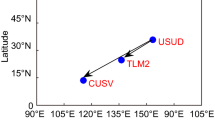Abstract
Precise point positioning (PPP) technology is a positioning enhancement technique that can cover a large area and reduce the cost of positioning. With the support of real-time precise orbit and clock offset products, the global real-time PPP can be realized, which greatly improves the effectiveness and availability of the results. First, in this paper, the global real-time precise orbit and clock offset can be calculated by the BeiDou global continuous tracking station. Then the BeiDou global-enhanced message is designed, the frequency and the type of broadcasting-enhanced message are analyzed. Finally, the real-time PPP accuracy of BDS is studied. The actually measured numerical example shows that the real-time PPP based on BDS can achieve decimeter-level position accuracy in the Asian-Pacific region.
Access this chapter
Tax calculation will be finalised at checkout
Purchases are for personal use only
Similar content being viewed by others
References
Zhu Y, Feng L, Jia X et al (2015) The PPP precision analysis based on BDS regional navigation system. Acta Geodaetica Cartogr Sin 44(4):377–383
Shi C, Lou Y, Song W, Cai H The prototype system and preliminary results of wide area real time precision positioning
Li J (1995) Satellite precision orbit determination. Chinese People’s Liberation Army Publishing House, Bei**g
He S, Wu B, Chen J (2011) Orbit predictions for GPS satellites using IGS ephemeris. Annals of Shanghai Observatory Academia Sinica 32:25–34
Lou Y, Shi C, Ge M et al (2008) GPS real time orbit determination and initial results analysis. Geomatics Inf Sci Wuhan Univ 33(8):815–817
Heo YJ, Cho J, Heo MB (2010) Improving prediction accuracy of GPS satellite clocks with periodic variation behavior. Meas Sci Technol 21:073001. doi:10.1088/0957-0233/21/7/073001
Huang GW, Zhang Q, Li HT et al (2012) Research on quality variation of GPS satellite clocks on-orbit using IGS clock products. Adv Space Res 51:978–987. doi:10.1016/j.asr.2012.09.041
Huang GW, Zhang Q et al (2013) Real-time clock offset prediction with an improved GPS satellite clocks model. GPS Solution. doi:10.1007/s10291-013-0313-0
Bock H, Dach R, Jaggi A, Beutler G (2009) High-rate GPS clock corrections from CODE: support of 1 Hz applications. J Geod 83(11):1083–1094. doi:10.1007/s00190-009-0326-1
Zhang XH, Li XX, Guo F (2010) Satellite clock estimation at 1 HZ for realtime kinematic PPP applications. GPS Solut (in press). doi:10.1007/s10291-010-191-7
Ge M, Chen J, Douša J, Gendt G, Wickert J (2012) A computationally efficient approach for estimating high-rate satellite clock corrections in realtime. GPS Solut 16:9–17. doi:10.1007/s10291-011-0206-z
Zhang X (2006) Accuracy analysis of dynamic precise point positioning. Glob Positioning Syst 01:7–11+22
Acknowledgments
This research was supported by the project of National Natural Science Fund (41104019, 41104022, 41304033, and 41504006), Project of Chinese Hydropower Engineering Consulting Group of science and technology (GW-KJ-2012-21), the Special Fund for Basic Scientific Research of Central Colleges (Grant No. 310826165014, Chang’an University). The authors would like to thank The open foundation of National Key Laboratory of Geographic Information Engineering (2013ADL-DW0103), The open fund of Sate Key Laboratory of Geographic Information Engineering (SKLGIE2013-Z-2-1) and Central University Research Funds (2014G1261051), The National Natural Science Foundation of China, Light of West China, for their support, and to the editor and anonymous referees for their valuable suggestions.
Author information
Authors and Affiliations
Corresponding authors
Editor information
Editors and Affiliations
Rights and permissions
Copyright information
© 2016 Springer Science+Business Media Singapore
About this paper
Cite this paper
Wang, J., Zhang, Q., Huang, G., Tu, R., Fu, W., Li, P. (2016). An Enhanced Global Positioning Technology and Precision Verification of BDS. In: Sun, J., Liu, J., Fan, S., Wang, F. (eds) China Satellite Navigation Conference (CSNC) 2016 Proceedings: Volume II. Lecture Notes in Electrical Engineering, vol 389. Springer, Singapore. https://doi.org/10.1007/978-981-10-0937-2_23
Download citation
DOI: https://doi.org/10.1007/978-981-10-0937-2_23
Published:
Publisher Name: Springer, Singapore
Print ISBN: 978-981-10-0936-5
Online ISBN: 978-981-10-0937-2
eBook Packages: EngineeringEngineering (R0)




